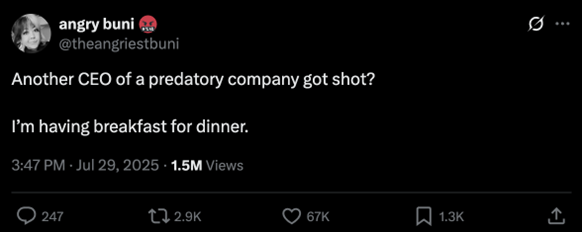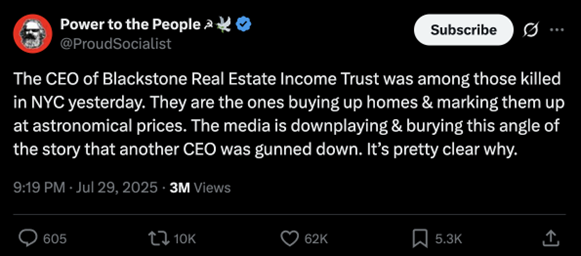Several weeks ago, an unknown 27-year-old named Shane Tamura walked into a skyscraper lobby in midtown Manhattan, took out an assault rifle he carried with him from Las Vegas, and opened fire. His killing spree resulted in the death of four individuals; it is the worst mass shooting in New York City for over two decades.
Within hours, social media was awash with memeified images reminiscent of those that circulated last December, when an otherwise reclusive 26-year-old named Luigi Mangione walked to the New York Hilton Midtown, pulled out a 3D-printed pistol, and fatally shot UnitedHealthcare CEO Brian Thompson. Both shootings occurred within a few blocks of each other.
Finally, a reason to check your email.
Sign up for our free newsletter today.
Tamura’s violence may have been aimed at the NFL offices in the building, motivated by a claimed head injury. However, on social media, an alternative narrative quickly emerged—one rooted in Marxist class struggle and bolstered by conspiracy theories. It claimed that Tamura was following in the footsteps of Mangione. In other words, many came to believe that the shooter had committed an act of revolutionary political violence on the streets of New York.
The main evidence cited for this narrative was that one of the killer’s principal victims, Wesley LePatner, was CEO of Blackstone Real Estate Income Trust. Widespread chatter on X applauded her killing, falsely accusing her of helping orchestrate the firm’s post-2008 purchase of homes and of financially impoverishing millions of Americans with high rents. Many posts were content simply to cheer the death of a wealthy CEO. According to our analysis, mentions of “CEO Down” on X spiked to nearly ten times their average baseline between the start of July and the New York attack last week.

Many responses to coverage of LePatner’s murder embraced the familiar conspiratorial notion of a high-level coverup. In one version, commentators on X claimed that a coalition of media forces was working to hide the fact that she had been “Luigi’d”—Internet slang for being the victim of explicitly anti-capitalist violence. They dismissed as misdirection the claim that Tamura “accidentally” killed LePatner, as well as the idea that he had been targeting the NFL and simply got off the elevator on the wrong floor. All such explanations, they insisted, were whitewashing meant to keep people from “waking up” and seeing the truth.

Some commentators on X saw proof of complicity in mainstream media headlines. The Wall Street Journal’s coverage, originally titled “One of Blackstone’s Highest-Ranking Women Killed in Shooting,” was cited as evidence of a conspiracy. Why? Because LePatner was a CEO of Blackstone, not merely a senior executive; conspiracists claimed the paper was “downplaying” her role. Such narratives reflected the online belief that the purpose of this supposed coverup was to shield the ruling classes from the inevitable revolt that would follow successful acts of political violence against the corporate elite.

The prevalence of this chatter on social media reflects the unabated growth of what the Network Contagion Research Institute has termed “assassination culture.” Primarily found in left-leaning digital spaces, this online subculture glorifies the political violence epitomized by Mangione’s killing of Thompson last year. Indeed, those affiliated with such an ideology will commonly share memes of Nintendo’s Luigi to cloak the celebration of such violence.
We’ve previously identified how these actions appear to be associated with left-wing authoritarianism (defined as willingness to use coercion for ostensibly progressive objectives) and poor external locus of control (reflecting the degree of powerlessness that people feel in their own lives). People who feel more helpless in controlling their own future are more likely to cheer the murder of wealthy, high-status Americans as a solution to their troubles.
The consequences for American civic life are ominous. The slow but steady rise in justifications for political violence bodes ill for any democracy. Praise for Tamura’s actions—regardless of his true motive—points to a growing belief that electoral politics no longer work and that violent extremism is the only way to challenge a corrupted system.
Top Photo by Michael M. Santiago/Getty Images
City Journal is a publication of the Manhattan Institute for Policy Research (MI), a leading free-market think tank. Are you interested in supporting the magazine? As a 501(c)(3) nonprofit, donations in support of MI and City Journal are fully tax-deductible as provided by law (EIN #13-2912529).
Source link
















